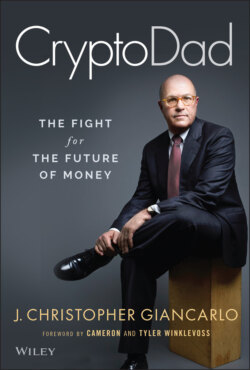Читать книгу CryptoDad - J. Christopher Giancarlo - Страница 23
Lemons into Lemonade
ОглавлениеCutting across Dupont Circle past its grand marble fountain, I reached a decision. Okay, I could not give a speech at SEFCON. That did not mean I could not give a speech. The First Amendment was still intact. I would give the speech, just not at SEFCON.
I ducked into a deli and grabbed a sandwich and a lemonade. I then turned south onto New Hampshire Avenue and walked 300 more yards to 21st Street and the CFTC offices. I greeted the security detail, tapped my electronic card to open the double turnstiles, and then rode the elevator back to the ninth-floor office suite.
Back at my desk, I called the staff together, unwrapped my sandwich, and laid out my plan.
“I'm going to give the speech … just not at SEFCON.
“We'll explain right up front that I intended to give it at the conference, but that the White House denied a waiver to speak. We'll release the speech to the press and post it on the CFTC website on the morning of the conference.
And so we got to work. We revised the speech to address a lay audience and set it to be released the evening before the conference. We also provided an advance copy to a business reporter, Katy Burne of the Journal, whom I knew from my years in the industry. I knew that she would cover the substance of my remarks from a business perspective, not from the usual political winners-and-losers viewpoint of the inside-the-beltway media. In the middle of these preparations, the Financial Times informed us that they were about to publish an op-ed that I had submitted several weeks before touching on some of the same issues.
With our plan in place, I headed up to Philadelphia for college parents' weekend with our elder son and then to our home in New Jersey. On Monday, I crossed the Hudson River by ferry to the CFTC's office on Broadway in downtown Manhattan. I rode the elevator to the 19th floor and greeted the helpful receptionist. Fishing out my keys, I unlocked the door to a simple but comfortable office, set down my briefcase, sipped a coffee and logged onto a computer. Scrolling through the morning's emails, briefings, and press clippings I was delighted to see that the FT had published my piece. Here are a few key passages:
“In 2009, world leaders in Pittsburgh pledged to better regulate emergent global swaps markets through the co-ordinated efforts of national and supranational regulators.
“Five years later, global co-ordination is not going well. Instead of collaborating with foreign regulators, the US Commodity Futures Trading Commission (CFTC) developed swaps ‘transaction level’ rules based on the wrong template of the structure of the US futures markets…
“To maintain healthy global markets, we must regulate swaps execution and clearing in a well-crafted and harmonious manner across jurisdictions.”19
Later that afternoon, I got on the telephone with Katy Burne of the The Wall Street Journal and answered several questions she had about my speech. She also asked me about the White House's refusal of the waiver. I told her that I declined to question the White House's decision, but that she was free to make her own inquiries.
The following evening as the organizers of SEFCON V were setting up their podium and exhibition hall at the Grand Hyatt Hotel on 42nd Street and Lexington Avenue, Katy's story ran. She nailed it.
“A top U.S. regulator said new rules governing the multitrillion-dollar derivatives markets are sending swaps trading overseas, threatening Wall Street jobs and potentially destabilizing financial markets.
“In remarks he intended to deliver at an industry conference this week, J. Christopher Giancarlo, the lone Republican among four commissioners at the Commodity Futures Trading Commission, said the agency's rules have split the swaps market into domestic and foreign niches, as non-U.S. firms seek to avoid CFTC oversight.
“Mr. Giancarlo said he had planned to deliver the remarks Wednesday at a conference in New York. He said he withdrew after unsuccessfully seeking a waiver of government ethics rules that view his past work with swaps brokerage firms as a conflict. CFTC Chairman Timothy Massad is scheduled to deliver the keynote speech at the conference Wednesday.
“Mr. Giancarlo has long been a critic of the implementation of CFTC swaps-trading rules, though he backs mandates for overhauling the swaps market in general, including the requirement that many be processed through clearinghouses, which guarantee trades. New clearing and data-reporting rules for swaps were well-crafted and are meeting their objectives, he said.”20
